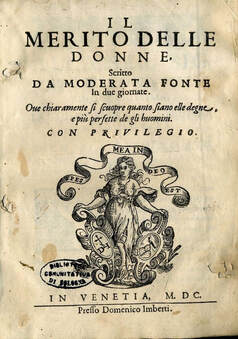Here, Fonte highlights the double standard held against women with regards to their sexual relationships. While men receive praise when they have sex, women face shame from society. Relatedly, while men can boast about their sexual conquests, women are expected to hide any sign of their sexual life. Fonte argues that these responses reveal the difference in dignity between the sexes as women treat sex with more nobility than men. Yet, while men are able to find “glory and happiness” in sex, women who engage in the sex act, whether inside or outside of marriage, are necessarily degraded. It is important to note that Fonte does not argue against women feeling shame for having sex. Instead, she agrees the act is shameful but insists the shame derives from the superior sex, women, engaging with the inferior sex, men.
The sexes also experience a stark difference in the dependence they have on their relationships with the opposite sex. To become a “real man,” according to Fonte, one must build a relationship with a woman through marriage. Only after having that relationship can a man achieve “happiness, honor, and greatness.” In contrast, women thrive best when they are given full independence from men. Fonte emphasizes the power of female virginity as a way in which women can achieve divine greatness. A woman, untouched by men, has “something divine about her” and can accomplish “miracles.” Not only does Fonte define men as the inferior sex, she also describes them as a kind of parasite that reduces the value and abilities of women as “intercourse with men abases” women. In this way, men threaten women who seek to reach their full, sometimes divine, potential. Moreover, Fonte examines how women face greater disapproval from society in comparison to men in having sex. Cornelia, a character in the dialogue, explains the hypocrisy of this treatment, especially when it comes from men, and says, “They can keep up these curses and insults all day without once looking down at themselves and seeing that they may need to take some of the blame… if the fault is common to both sexes (as they can hardly deny), why should the blame not be as well?” (90) Once again, Fonte highlights the inequitable treatment of the sexes by society. Men encourage this unfounded response as they do not reflect on their own faults and instead, hurl insults at women who have sex despite taking equal part in the act. Throughout the first half of the dialogue, Fonte reveals the extreme hypocrisy of society in its treatment of men and women as sexual persons while also defending women as the superior sex as seen in their unique ability to thrive independently of men. -MP Text source: The Worth of Women: Wherein Is Clearly Revealed Their Nobility and Superiority to Men. Edited and Translated by Virginia Cox, The University of Chicago Press, 1997. Image info: Cover of Moderata Fonte's Il Merito Delle Donne, illustrated by Domenico Imberti, published in Venice in 1600 Source: http://badigit.comune.bologna.it/books/Moderata_Fonte/scorri.asp
1 Comment
6/25/2024 06:32:48 am
Fascinating take on Fonte's analysis of the sexual double standards between men and women. It's intriguing how she elevates women's dignity in sexuality while critiquing societal norms that shame women for the same actions men are praised for. Fonte’s perspective that women inherently possess a divine quality untouched by male influence is a powerful assertion of female independence and worth. 🌟👩🎓💬
Reply
Leave a Reply. |
Authors
Jacinta Shrimpton is a PhD student in Philosophy at the University of Sydney. She is co-producer of the ENN New Voices podcast Archives
May 2024
Categories
All
|

 RSS Feed
RSS Feed